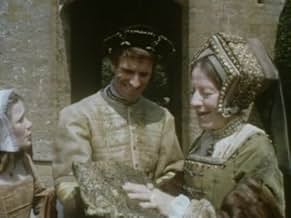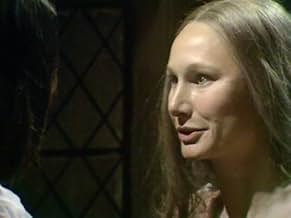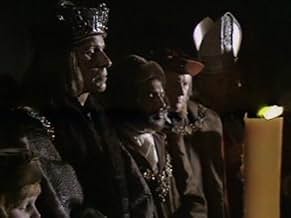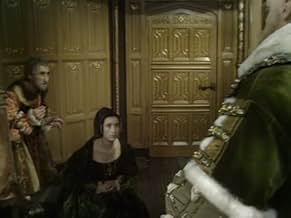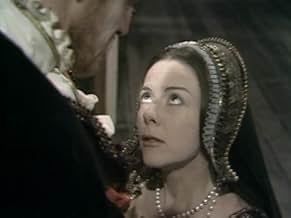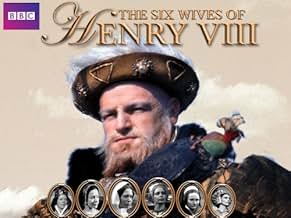IMDb-BEWERTUNG
8,4/10
1523
IHRE BEWERTUNG
Füge eine Handlung in deiner Sprache hinzuA six-episode dramatization of Henry VIII's relationships with each of his six wives. Each episode is devoted to one wife, and is a complete play in itself.A six-episode dramatization of Henry VIII's relationships with each of his six wives. Each episode is devoted to one wife, and is a complete play in itself.A six-episode dramatization of Henry VIII's relationships with each of his six wives. Each episode is devoted to one wife, and is a complete play in itself.
- 1 Primetime Emmy gewonnen
- 7 Gewinne & 8 Nominierungen insgesamt
Folgen durchsuchen
Empfohlene Bewertungen
This series - and can you imagine the BBC financing and supporting a nine-hour historical drama series these days? - focuses on one of the six wives each episode, an interesting approach which comes off better in some instalments than others. Still, what is here is excellent - and far better than the ridiculously truncated film which followed a few years later.
Keith Michell as Henry. What more can I add to the praise which has already been put forward? He is excellent in every episode; we see Henry as a complex character who at times can cause us to sympathise with his predicament. The writing of this series is tight and believable, and the supporting characters are solid. This always helps move a series along when many supporting players are there throughout. Of particular note are Patrick Troughton as Norfolk, Bernard Hepton as Cranmer, and Sheila Burrell as Lady Rochford.
Of the six wives, all are excellent in their own ways. Katherine of Aragon's story is rushed, but Annette Crosbie does her best and is both memorable and pathetic ... Dorothy Tutin as Anne Boleyn is more fiery but the trial scene is truly regal and gives a different perspective ... Anne Stallybrass as Jane Seymour is sweet, pious, and just a little bit cunning (and that episode, largely in flashback as Jane lies sick to death at her son's christening, is well done) ... Elvi Hale as Anne of Cleves is extremely convincing, and her episode is full of intrigue ... Catherine Howard, as played by Angela Pleasance, is all gloss and no substance, but you still feel for her as she goes headlong to her fate without recognition ... and Rosalie Crutchley as Katharine Parr is a dull old crow in black, widow of old men, who at first resents her lot and then comes to respect and love the sick king.
This series really is remarkable. I would never get bored watching it - and eventually, it led to another top-class BBC drama, Elizabeth R, using some of the same cast and moving the story through the reigns of Edward VI, Mary I, and Elizabeth I herself.
Keith Michell as Henry. What more can I add to the praise which has already been put forward? He is excellent in every episode; we see Henry as a complex character who at times can cause us to sympathise with his predicament. The writing of this series is tight and believable, and the supporting characters are solid. This always helps move a series along when many supporting players are there throughout. Of particular note are Patrick Troughton as Norfolk, Bernard Hepton as Cranmer, and Sheila Burrell as Lady Rochford.
Of the six wives, all are excellent in their own ways. Katherine of Aragon's story is rushed, but Annette Crosbie does her best and is both memorable and pathetic ... Dorothy Tutin as Anne Boleyn is more fiery but the trial scene is truly regal and gives a different perspective ... Anne Stallybrass as Jane Seymour is sweet, pious, and just a little bit cunning (and that episode, largely in flashback as Jane lies sick to death at her son's christening, is well done) ... Elvi Hale as Anne of Cleves is extremely convincing, and her episode is full of intrigue ... Catherine Howard, as played by Angela Pleasance, is all gloss and no substance, but you still feel for her as she goes headlong to her fate without recognition ... and Rosalie Crutchley as Katharine Parr is a dull old crow in black, widow of old men, who at first resents her lot and then comes to respect and love the sick king.
This series really is remarkable. I would never get bored watching it - and eventually, it led to another top-class BBC drama, Elizabeth R, using some of the same cast and moving the story through the reigns of Edward VI, Mary I, and Elizabeth I herself.
This was one of the most amazing pieces of television/theater. I was 17 when I watched it for the first time and about 10 years ago, acquired the miniseries on VHS. Just recently I was given the DVD set as a gift. I've been re-watching it and I marvel at just how amazing the production and the performances were. At the time Keith Michell played Henry, the actor was in his early 40's yet managed to portray the monarch from age 18 till his death at 56. Simply remarkable and I think Michell is the consummate Henry VIII. As the previous poster, my favorite episodes were Anne Boleyn and Catherine Howard; I didn't know Ms. Pleasence was Donald Pleasance's daughter. I also enjoyed Annette Crosbie's performance; she also portrayed Queen Victoria in the miniseries about Edward VII. All in all, this is one of the finest miniseries ever done on television and I doubt we'll see its equal anytime soon.
This is one of the most popular and best-remembered BBC drama productions of all time. As well as drawing record audiences in the early seventies, it spawned the equally impressive follow-up - Elizabeth R. The Six Wives of Henry VIII is not held in such high regard without good reason. It is perhaps the most historically accurate dramatic account of this period in history we will ever see.
As well as its accuracy, the series is remembered for the performances of the actors. Keith Michell shines throughout as King Henry aging from an athletic young prince to a monstrously obese tyrant. All of the actresses deliver sterling performances as the wives. Standouts from the supporting cast include Sheila Burrell as the conniving Lady Rochford, Wolfe Morris as manipulative Thomas Cromwell, Patrick Troughton as the Duke of Norfolk and Bernard Hepton as Archbishop Cranmer, a role he was to reprise in Elizabeth R and the 1973 cinema remake of this series.
The costumes and makeup for this series cannot go unmentioned. They are little short of outstanding. One would almost believe Keith Michell was swapped for an older, fatter actor for the latter three episodes and the costumes change throughout, depicting shifts in courtly fashions.
CATHERINE OF ARAGON Perhaps the least lavish play in terms of production values, but among the better ones for scripting and acting. It begins, rather ploddingly, by covering Catherine's time in England before her marriage to Henry. When they do wed, the story skips abruptly to Henry's courtship with Anne Boleyn and the divorce of Catherine. Midway through this episode Anne Boleyn is Queen and Catherine is left dying away from court. It closes with her death in 1536.
ANNE BOLEYN A somewhat disappointing installment, despite wonderful acting and a sharp script. Anne is without a doubt the most famous wife of Henry VIII and the one who has provoked the most interest from historians, yet much of her life goes untold in this series. The earlier events in her story were rushed through in a handful of scenes in the second half of the Catherine of Aragon episode, and this episode focuses entirely on her downfall. Half of this play is dedicated to the last eighteen days of Anne's life, in the tower. Dorothy Tutin's fine performance brings this play back on par with the better ones in the series though.
JANE SEYMOUR Something of an anomaly within this series. It breaks with the continuity of the other five plays by covering events that had already been dealt with in Anne Boleyn's episode. The result is that Anne's execution is depicted twice during the course of the series. It also stands out from the rest in terms of production. The other five episodes are filmed as theatrical pieces whilst Jane Seymour is visibly an example of television drama. It's a shame that perhaps the dullest of Henry's wives gets by far the best treatment in the series. The real mystery of this episode is why the format suddenly changes before reverting back to the old style for the final three installments.
ANNE OF CLEVES It was never going to be easy to write a ninety-minute play about a largely unimportant, six-month-long mistake, but everybody involved seems to have made their best efforts here. Anne of Cleves is interpreted as being far more intelligent and witty than she cared to show in the English court and Elvi Hale plays her well. It's very absorbingly written too.
CATHERINE HOWARD It's difficult to decide what to make of this episode. The script has Catherine as a match for her ill-fated cousin, Anne Boleyn, with cunning intelligence, when she was, in fact, a frivolous girl who was thrust too high for her own good. It is, nonetheless, a good adaptation of her story and Sheila Burrell is fantastic as Lady Rochford. As with all the other episodes, there is a reluctance to paint Henry in a bad light here and Catherine almost comes out as the villain of the piece.
CATHERINE PARR Perhaps the most neglected wife in public interest, Catherine Parr's story is actually full of intrigue. This episode deals with her strong religious views and her enforcement of them which nearly sent her to a grizzly fate. Unlike the others in the series, this play relies heavily on dialogue rather than action and it closes the story well.
So the only real failing of the series is not that it is shown in six episodes, but that one episode is dedicated to each wife. The story could have been told more comprehensively if parts 1-3 dealt with Catherine of Aragon's time as Queen, her fall from grace in favour of Anne Boleyn, the divorce, the religious reforms brought about by the King's desire to marry Anne Boleyn and have her children as heirs to the throne, Anne's marriage to the King and her eventual downfall. Jane Seymour would be best dealt with in part 4, Anne of Cleves and Catherine Howard merged together in the fifth part, whilst Catherine Parr and the King's death could be covered in the sixth.
This criticism aside, the series has earned every word of praise ever spoken for it. It is one of the best nine hours you can spend watching a television drama, so go out and watch it.
As well as its accuracy, the series is remembered for the performances of the actors. Keith Michell shines throughout as King Henry aging from an athletic young prince to a monstrously obese tyrant. All of the actresses deliver sterling performances as the wives. Standouts from the supporting cast include Sheila Burrell as the conniving Lady Rochford, Wolfe Morris as manipulative Thomas Cromwell, Patrick Troughton as the Duke of Norfolk and Bernard Hepton as Archbishop Cranmer, a role he was to reprise in Elizabeth R and the 1973 cinema remake of this series.
The costumes and makeup for this series cannot go unmentioned. They are little short of outstanding. One would almost believe Keith Michell was swapped for an older, fatter actor for the latter three episodes and the costumes change throughout, depicting shifts in courtly fashions.
CATHERINE OF ARAGON Perhaps the least lavish play in terms of production values, but among the better ones for scripting and acting. It begins, rather ploddingly, by covering Catherine's time in England before her marriage to Henry. When they do wed, the story skips abruptly to Henry's courtship with Anne Boleyn and the divorce of Catherine. Midway through this episode Anne Boleyn is Queen and Catherine is left dying away from court. It closes with her death in 1536.
ANNE BOLEYN A somewhat disappointing installment, despite wonderful acting and a sharp script. Anne is without a doubt the most famous wife of Henry VIII and the one who has provoked the most interest from historians, yet much of her life goes untold in this series. The earlier events in her story were rushed through in a handful of scenes in the second half of the Catherine of Aragon episode, and this episode focuses entirely on her downfall. Half of this play is dedicated to the last eighteen days of Anne's life, in the tower. Dorothy Tutin's fine performance brings this play back on par with the better ones in the series though.
JANE SEYMOUR Something of an anomaly within this series. It breaks with the continuity of the other five plays by covering events that had already been dealt with in Anne Boleyn's episode. The result is that Anne's execution is depicted twice during the course of the series. It also stands out from the rest in terms of production. The other five episodes are filmed as theatrical pieces whilst Jane Seymour is visibly an example of television drama. It's a shame that perhaps the dullest of Henry's wives gets by far the best treatment in the series. The real mystery of this episode is why the format suddenly changes before reverting back to the old style for the final three installments.
ANNE OF CLEVES It was never going to be easy to write a ninety-minute play about a largely unimportant, six-month-long mistake, but everybody involved seems to have made their best efforts here. Anne of Cleves is interpreted as being far more intelligent and witty than she cared to show in the English court and Elvi Hale plays her well. It's very absorbingly written too.
CATHERINE HOWARD It's difficult to decide what to make of this episode. The script has Catherine as a match for her ill-fated cousin, Anne Boleyn, with cunning intelligence, when she was, in fact, a frivolous girl who was thrust too high for her own good. It is, nonetheless, a good adaptation of her story and Sheila Burrell is fantastic as Lady Rochford. As with all the other episodes, there is a reluctance to paint Henry in a bad light here and Catherine almost comes out as the villain of the piece.
CATHERINE PARR Perhaps the most neglected wife in public interest, Catherine Parr's story is actually full of intrigue. This episode deals with her strong religious views and her enforcement of them which nearly sent her to a grizzly fate. Unlike the others in the series, this play relies heavily on dialogue rather than action and it closes the story well.
So the only real failing of the series is not that it is shown in six episodes, but that one episode is dedicated to each wife. The story could have been told more comprehensively if parts 1-3 dealt with Catherine of Aragon's time as Queen, her fall from grace in favour of Anne Boleyn, the divorce, the religious reforms brought about by the King's desire to marry Anne Boleyn and have her children as heirs to the throne, Anne's marriage to the King and her eventual downfall. Jane Seymour would be best dealt with in part 4, Anne of Cleves and Catherine Howard merged together in the fifth part, whilst Catherine Parr and the King's death could be covered in the sixth.
This criticism aside, the series has earned every word of praise ever spoken for it. It is one of the best nine hours you can spend watching a television drama, so go out and watch it.
Six or seven hours of film (or was it tape) make "The Six Wives of Henry VIII" a series, not a movie. But here's a clear case of more is more. Each of Henry's wives gets her own story and collapsing those stories into a couple of hours is a disservice. Keith Michell as Henry and Anthony Quayle as the narrator are fine actors and they provide continuity. But the actresses playing the six wives are also excellent and each of the episodes stands up on its own. Ignore the nay sayers on this. This is another of the drama series that BBC does so well and that have benefited those of us who watch them on PBS. There have been a lot of good ones but this may be the best of the lot.
I have seen this series many times and enjoy it immensely every time I see it. I have read a number of biographies of Henry VII and this series is the most accurate portrayal of Henry VIII I have seen, making him a sympathetic character in spite of the way he treated some of his wives (in contrast, "The Private Life of Henry VIII," with Charles Laughton as Henry, is absolutely ludicrous in its portrayal of Henry and his wives). Watching this series gives one a good understanding of how a king could go through six wives, having two of them executed and one driven to an early death through mistreatment. Yet he is never exactly hero or villain, he is portrayed as a human being, who only once went into a marriage that was not for love, and quickly got out of it (through annulment). Anyone who is interested in the history of England's monarchy should enjoy this series. And a good follow up series is "Elizabeth R", with Glenda Jackson playing the title role (quite excellently).
Wusstest du schon
- WissenswertesKeith Michell was one hundred eighty-eight centimeters (six feet one inch) tall, the same height as the real Henry VIII.
- VerbindungenFeatured in The 24th Annual Primetime Emmy Awards (1972)
Top-Auswahl
Melde dich zum Bewerten an und greife auf die Watchlist für personalisierte Empfehlungen zu.
- How many seasons does The Six Wives of Henry VIII have?Powered by Alexa
Details
Zu dieser Seite beitragen
Bearbeitung vorschlagen oder fehlenden Inhalt hinzufügen

Oberste Lücke
By what name was Die sechs Frauen Heinrich VIII (1970) officially released in India in English?
Antwort
